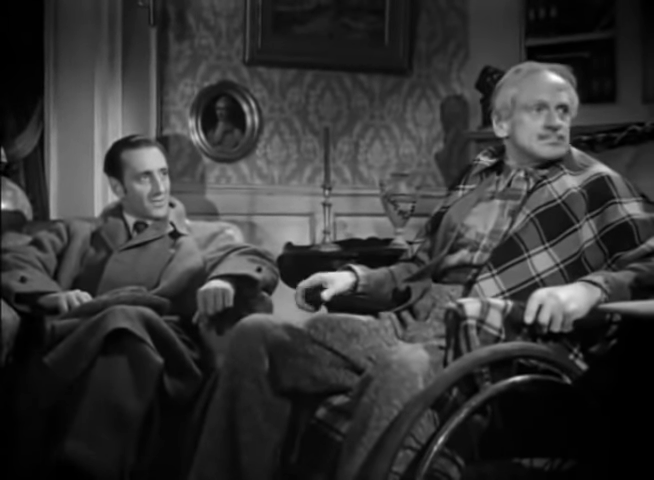The Scarlet Claw, the eighth of the Basil Rathbone Sherlock Holmes movies (available on YouTube, as are all the others) is set north of Quebec City, I presume for propaganda reasons—it was made in 1944, and ends with Holmes quoting Churchill on Canada as “the linchpin of the English-speaking world.” Though it’s in a small Quebec town (which at the time I think would have been entirely French-speaking), most of the people have English accents. As in London, England. There is a lot of plaid, however.
The character Judge Brisson is played by Miles Mander, a character actor who was in scores of movies in the thirties and forties. Here he is nervously talking to Rathbone as Holmes.

Manders’s bio in Wikipedia has this fascinating line (uncited, as is the rest of the personal information):
His first wife was Pratibha Devi, a princess of Cooch Behar. She was the daughter of Maharaja Nripendra Narayan and Maharani Suniti Devi of Cooch Behar and paternal aunt of Gayatri Devi, Maharani of Jaipur.
Cooch Behar reminded me of “The Cannon Song,” from The Threepenny Opera. Here it is from the Kurt Weill tribute Lost in the Stars, sung by Stan Ridgway:
The troops live under
The cannon’s thunder
From Sindh to Cooch Behar
Moving from place to place
Till they come face to face
With a different breed of fellow
Whose skins are black or yellow
And quick as winking cut them into beefsteak tartare
Manders was born in England in 1888, went to university at McGill in Montreal, served in the First World War, then farmed sheep in New Zealand in the twenties. Where did he meet a princess? From her father’s Wikipedia bio, it seems she was raised in England. In To My Son—In Confidence (Faber and Faber, 1934), towards the end in the chapter “On Conduct and Character,” he has this story involving her (pp. 232–233):
There is one incident in my life that I shall not easily forget. It occurred, also before the War, when I was married to my first wife. She was returning from a sea voyage and met on board the ship an officer in a cavalry regiment. He fell in love with her, and she, being on a voyage of convalescence, was in a receptive mood for sympathy. I realized when I met her on her return that she had become infatuated with the man. Instead of allowing my jealousy to get the better of me, I sat down and wrote him a letter, pointing out the unhappiness he would cause if he pursued the friendship and begging him to have no further communication with her. He replied in a sincere manner, saying that he would most certainly respect my wishes in every way, also adding that he would like to meet me.
I lunched with him. He was charming, but we did not refer to the incident. However, I recognized a man of his word. He never saw her again.
In 1915, two years later, I was dining at a little estaminet in France, reserved for officers. A man sat down in a vacant place next to me, and turning, I saw my cavalry friend. He was in the uniform of a Staff Colonel and had already lost a leg. Our conversation was general, but my heart went out in gratitude and admiration for this man who had so nobly kept his word.
So married before the Great War, and it doesn’t sound successful. Nor was the second, which produced (in 1926) the son of To My Son. Manders writes (pp. 22–23):
You will know by the time you are old enough to read these pages, in fact I think you already realize, that your mother and I do not cohabit to the extent that conventionally married people should. We meet, we go out together, and I know that fundamentally we are immensely fond of each other. But the external influences that modem civilization brings to bear on men and women who have mated according to legal requirements are so complex, irritating, subversive, and difficult of understanding that it requires either a nature of supreme tolerance, a common feeling of supine indifference, or a perception of acute dumb-headedness before they can be withstood and viewed in their right perspective. Neither your mother nor I are blessed with these attributes. We find, therefore, that the mutual enjoyment of each other’s company is limited.
Then (pp. 25–26):
I am a bit of a tramp, and therefore I suppose, for a tidy-minded person, unsatisfactory to live with. In small matters like my personal comfort I am selfish; in big things, I believe, the reverse. I am not an egoist, but domesticity offends my ego. I give your mother her complete freedom because I trust her. I insist upon my own. The trouble is that she is one of those women who, reacting to a primitive instinct of domestic hegemony, does not desire her freedom. But it is as necessary to my particular nature and my work as the air is to the lungs. I cannot live in bondage to the hearth. I must adventure forward. During difficult times people have said to me, “If only you could get a regular job in the City.” I can’t imagine anything more dreadful than having a regular job anywhere—let alone in the City.
What astonishing things to write—especially in a book published when your son is eight years old.
WorldCat has Manders also as the author of Gentleman by Birth and Oasis, but there are no copies listed for either in North America. At least To My Son—In Confidence is easily available, as an incredible record of old attitudes.
 Miskatonic University Press
Miskatonic University Press